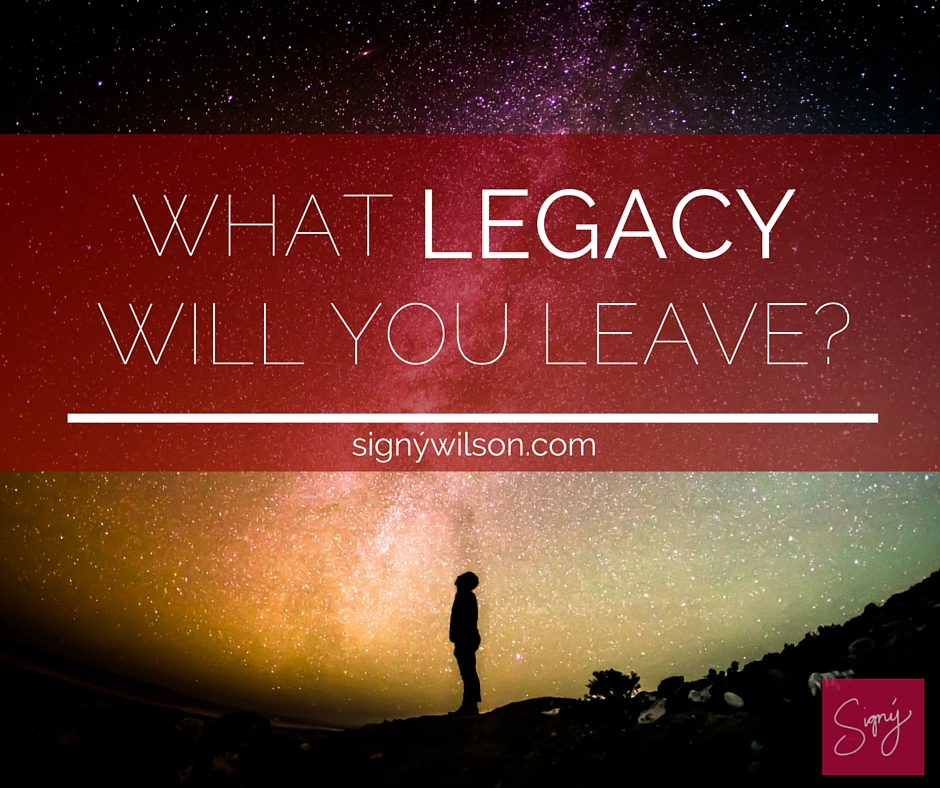Legacy is one of those loaded words. We all know we’re supposed to want to have it (at least when we’ve worked our way up Maslow’s hierarchy to the top). But what is it, how do we create it, and how do we create a legacy that’s actually true to who we are, not just one that looks good on paper?

To have real meaning, legacy needs to be more than just something on our to-do list.![]() Ideally it’s about how we are in the world, because how we are in the world is what we will be remembered for. It’s like we create a legacy through how people experience us. So the “being” of legacy is HOW you are being in the world. It is as if the brand that you are today, becomes the legacy you leave tomorrow.
Ideally it’s about how we are in the world, because how we are in the world is what we will be remembered for. It’s like we create a legacy through how people experience us. So the “being” of legacy is HOW you are being in the world. It is as if the brand that you are today, becomes the legacy you leave tomorrow.
Of course the “doing” of legacy are the actual monuments that are left in remembrance of your glory. And yes, that’s grandiose language, but you’ll see why I’m using it in a second.
Traditionally, a legacy is about money or property, or other elements of our estate that we leave to the next generation of our families. But recently, it has come to be more associated with the emotional legacy we leave for the generation that follows us, not just within our own family.
The clearest current Canadian example is Justin Trudeau’s election to Prime Minister of Canada. The reason why it’s such a good example is that the Trudeau story is rife with legacy. His father, Pierre Trudeau, left the legacy of bringing Canada together as a country in a way that hasn’t been attempted since Sir John A. Macdonald first did so.
Some people call Pierre Trudeau the father of modern Canada. It wasn’t a building that he left (although the Montreal airport has been named after him), it was a feeling of pride and connection and being a part of something bigger than ourselves that he gave to the country and the people of Canada. Now his son has picked up the political reins, creating the first Canadian political dynasty, and we will see where he takes it. How will we remember Justin Trudeau when he is finished leading our country, is a legacy that he gets to pre-plan by reflecting on his values, what’s important to him, and how he wants to serve this great country. Of course some elements of legacy can’t be planned and just come from who we are as people (who can forget Pierre’s Pirouettes?), while some of it is consciously and intentionally created (Pierre was always committed to a constitution that brought Canada together).
So as we, the leaders of our own lives, look at what legacy we want to leave, not just to our families, but to all of the people around us, we need to consider both how we are being in the world (in other words how we’ll be remembered) as well as what we want to consciously take a stand for and be a champion of.
You’re gonna leave an emotional legacy one way or another, because really, emotional legacy is about brand. For instance, we can all answer these questions : “What’s the legacy of Princess Diana?”, “What’s the legacy of Richard Nixon?”, “What’s the legacy of Oprah Winfrey?”, “What’s the legacy of Gloria Steinem?”. But the real question we need to ask ourselves is, what legacy will we leave?![]()
Ok over to you:
What’s important enough to you that you want to make it your legacy?











